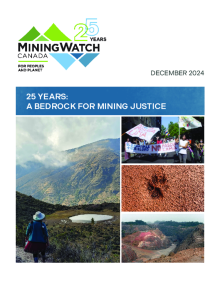Open letter | When will Quebec's mining laws respect the rights of Indigenous Peoples?
This open letter was originally published in French in Le Devoir here.
This open letter was originally published in French in Le Devoir here.
Nono Shen and Darryl Greer, Canadian Press
Doug Watt won't forget the sound of a tailings pond collapsing at the Mount Polley Mine more than 10 years ago, sending millions of cubic metres of waste into waterways in the British Columbia Interior.
“I went outside, and you could hear the roar. It was like standing close to Niagara Falls,” the 74-year-old said in an interview Tuesday.
MiningWatch Canada launched as a pan-Canadian initiative on April 1, 1999, on the heels of a decade that saw an unprecedented global expansion of mining brought about by economic globalization. Indigenous, environmental, social justice, and labour organizations came together with different backgrounds and experiences to respond to threats posed by irresponsible mining practices in Canada and around the world.


Audit finds delays to approve dozens of B.C. mines were largely caused by market forces — not government permitting.
Stefan Labbé, Business in Vancouver
For several years, politicians and the mining industry have targeted Canadian regulations standing in the way of feeding a burgeoning critical minerals market.
Imperial Metals now wants to expand the Mount Polley mine and continue discharging effluent into a lake. Conservation advocates wonder if charges today will reduce future risks
Sarah Cox, The Narwhal
Imperial Metals, the company that owns the Mount Polley mine in B.C.’s Interior, has been charged on 15 counts under the federal Fisheries Act.
(Ottawa/unceded territories of the Algonquin Nation) – One week before talks towards a business and human rights treaty, the Canadian Network on Corporate Accountability (CNCA) is calling on the federal government to support their progress and commit to urgent domestic measures that protect communities and workers around the world from harm.
In a letter to Minister of International Trade Mary Ng, the CNCA is urging the government to:
Collapse of Mount Polley tailings dam considered one of the worst environmental disasters in Canadian history
Andrew Kurjata, CBC News
More than a decade after spilling millions of litres of toxic wastewater into rivers in the B.C. Interior, Imperial Metals Corp. has been charged with 15 violations of the federal Fisheries Act.
Experts from the Environmental Law Alliance Worldwide (ELAW) say First Quantum’s Cobre Panama tailings dam is at very serious and imminent risk of failure due to internal erosion and a lack of proper monitoring. ELAW's report analyzes the Ninth Monitoring Report, presented by Minera Panama, a subsidiary of First Quantum Minerals that operates the Cobre Panama mine, in September 2024, together with other documents that were provided by the Ministry of Environment to ELAW experts who visited Panama in November 2024.

Canada’s failure to regulate gold mining companies is having a devastating impact in Colombia
Lital Khaikin, The Breach
In the last weeks of October, the Colombian city of Cali looked like a temporary war zone. Heavily militarized with tanks and artillery stationed around its core, the streets were patrolled and cordoned off by the state military, police officers, and private security.
Quebec’s appeal challenges Indigenous rights and environmental justice
MONTREAL/ TRADITIONAL TERRITORY OF THE KANIWN’KEHÁ:KA AND HAUDENOSAUNEE PEOPLES – Mitchikanibikok Inik First Nation (Algonquins of Barriere Lake) represented by Ecojustice, the Centre québécois du droit de l’environnement (CQDE), are heading back to court. Quebec has decided to appeal a ruling that upheld Indigenous rights in the province and that heralded an end to Quebec’s free entry mining regime.